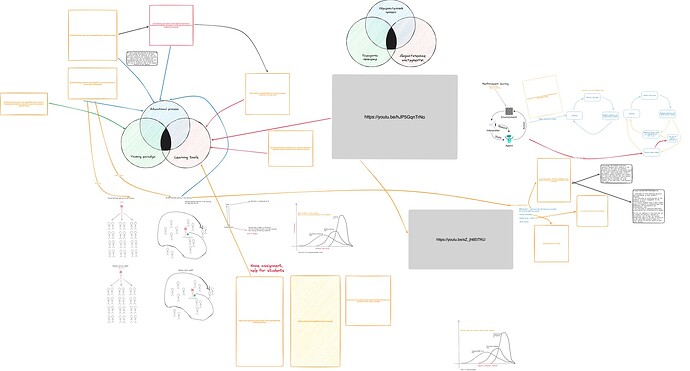Возвращаюсь к проекту.
Я долго думал о том, в каком виде мне устроить тот или иной проект, особенно большой. Но в итоге пошел от простого, создал отдельную заметку, в которой написал, что-то вроде плана.
План выглядит, буквально вот так:
- I think to start from description of the image of AI through time and in pop culture.
- Literally, AI in literature and pop culture.
- I can show how they all represented in culture, what we already do thanks to robots and after that move to compare expectations with what is really done today.
- Then from the world of imagination to Turing, Enigma, first AI etc.
- Maybe reencounter Dartmouth conference. Make it in the form of dialogue.
- And after this, we gradually move to GPT and the first installments of this thing.
- I should gather material about it.
- And the last chapter is going to be about challenges and dangers. Singularity.
Из этого выросло вот это: О роли ИИ в изменении профессий. Дизрупция, которая ломает старый образ работы и создает новый, сейчас еще третья часть не полностью загружена. Вот тут можно прочесть ее у меня в садике.
Ну или вот, спланировал то как будет выглядеть исследование по книге о чтении:
- I am actually thinking to start from the basic.
- Symbols and the way we decompose them. Understand and see. How we perceive the meanings from another language.
- Idea: On this, I need to explain how different word constructs build idea web.
- Idea: What role reading plays in overall comprehension of the text and how to penetrate the text deeper. Symbols are just a stage in the complex process of understanding.
- Idea: If so, maybe I should rename the chapter and explain what role symbols play in the process of understanding of the text and which role they play?
- Source: [[Когда книга учит]] there are plenty of different ideas about decoding symbols and in-depth comprehending of the text.
- Idea: What about the role which every part of the speech plays in the sentence? Focus on the crucial part: nouns, verbs and adjectives. Explain the meaning of abstractness and concreteness of the sentences. What adds what. And which words must be sheared off to get a better understanding.
- Idea Here I can also introduce an evolution of a reader. But I should stop on a strong reader. A case of a demanding reader must be considered in the reading part.
- Then we can go deeper into symbols, and how symbols on the paper or walls or in the air form our thinking patterns.
- Language and thought, what we know about the language we read on and how it influences the thinking. Mindset
- The material you are thinking over influences the quality of thoughts and ideas are coming with.
- Like in the third course of [[How to read books course by Rustam and Max]], we’ve made a mistake and proposed to read in the literature canteen five highly watery books. Which in turn couldn’t crank any qualitative thinking.
- The idea behind is that [[Critical thinking could not be taught]]
- No reading is good enough without the ability to use memory.
- Memory, the crucial part of reading and why people with poor memory can’t become strong or demanding readers.
- We can read, and we can intentionally avoid reading and still be experts in a field.
- Reading, how can we read and how can we not read and still be very intelligent.
- Idea: Vlad who designs tattoo machines, says that when he reads a book and a great idea strikes him, he immediately rushes to apply it. This approach has one drawback, if you test all ideas as soon as you find them in the body of written texts, you’ll never complete the reading. My opinion, that stands on the works of Adler and Povarnin, is that we should complete the book as fast as we can, then work with all net of ideas, and learn more from the casual and hidden connection they have in the system they exist.
- Idea We have to look at different types of reading, as has been said before, but initially, I’ve omitted the symbolic reading. Thomas Foster and his frame in reading fiction prose.
- Connection is all that matters. We can’t build a general idea of the topic, without building the strong network of ideas.
- Decomposition of ideas to keywords and key ideas. Drawing a mind map of ideas.
- Idea: Explain what are keywords and what role they play in the text.
- Scratching our thought with the book the author has written.
- Paraphrasing, transforming someone else’s ideas into our own.
- What will we do with all the loot?
- Note-taking is the effortful process that pays back in time.
- Turning notes and ideas into some product: article, lesson plan, workshop, etc.
- Premeditated research it the process where all separate skills meet each other. The result of this work, usually something interesting and exciting.
Это все в одной заметке. Далее установил себе плагин лонгформ, где непостредственно пишу исследование, настроил интеграцию с зотеро, теперь проставляются источники двумя кликами. А заметки у меня организуются вокруг темы, например как вот тут, когда обсуждал вопрос обучения и изменениях в образовании
Например, тут три аспекта, к каждому подтянута мысль или заметка. Из которой рождается текст исследования.
Как-то так. Ровно в таком же формате, родилась статья опубликованная в ваковском журнале, посвященная ИИ и дидактическим свойствам инструмента.
